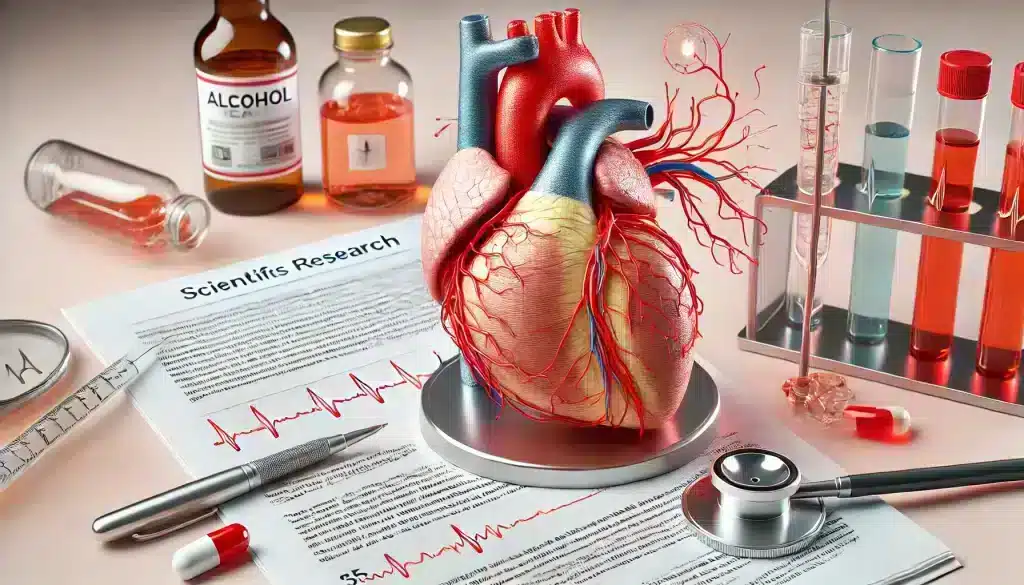Introduction
 Heart failure is a critical global health issue affecting millions of people worldwide. Understanding the factors that contribute to this condition is essential for prevention and management. One such factor is alcohol and heart failure, which has been linked to various cardiovascular diseases, including heart failure. This article explores how alcohol consumption affects heart failure, shedding light on the risks and offering insights into prevention strategies.
Heart failure is a critical global health issue affecting millions of people worldwide. Understanding the factors that contribute to this condition is essential for prevention and management. One such factor is alcohol and heart failure, which has been linked to various cardiovascular diseases, including heart failure. This article explores how alcohol consumption affects heart failure, shedding light on the risks and offering insights into prevention strategies.
Alcohol has been a part of human culture for centuries, but its impact on health, particularly heart health, is a subject of ongoing research and debate. By examining the scientific evidence, we aim to provide a comprehensive overview of the ways in which alcohol affects the heart and contributes to heart failure.
Understanding Heart Failure
Heart failure is a chronic condition where the heart muscle becomes weakened and cannot pump blood efficiently throughout the body. This inefficiency leads to inadequate blood flow, which can affect various organs and systems. Grasping the fundamentals of heart failure is essential to comprehend how alcohol and heart failure are interconnected and the implications of alcohol consumption on this condition.

The development of heart failure is often gradual, resulting from underlying health issues that strain or damage the heart over time. Early recognition and management are crucial for improving patient outcomes and quality of life.
Definition and Causes of Heart Failure
Heart failure, also known as congestive heart failure, is defined as the heart’s inability to pump sufficient blood to meet the body’s needs. Several factors can lead to this condition, including coronary artery disease, high blood pressure, and previous heart attacks. Notably, excessive alcohol consumption is a significant contributor, as it can weaken the heart muscle—a condition known as alcoholic cardiomyopathy.
Other causes encompass valvular heart diseases, congenital heart defects, and arrhythmias. Lifestyle factors such as smoking, poor diet, and lack of exercise also play a vital role in the onset and progression of heart failure.
Symptoms and Diagnosis
The symptoms of heart failure can vary but often include shortness of breath during daily activities, persistent coughing or wheezing, buildup of excess fluid in body tissues (edema), fatigue, and increased heart rate. These symptoms result from the body’s attempt to compensate for the reduced blood flow.
Diagnosing heart failure involves a combination of medical history evaluation, physical examinations, and diagnostic tests like echocardiograms, electrocardiograms, and blood tests. Understanding a patient’s alcohol use is essential during diagnosis, as the link between alcohol and heart failure can influence both the development and management of the condition.
Overview of Alcohol Consumption
Alcohol is a widely consumed substance, and its effects on the human body, particularly on the heart, have been extensively studied. While moderate alcohol consumption may have some protective cardiovascular effects, excessive drinking is a significant risk factor for developing heart-related conditions, including heart failure. Understanding the relationship between alcohol and heart failure requires exploring how alcohol interacts with the body and how different consumption patterns impact heart health.

In the context of heart failure, it’s crucial to distinguish between moderate and excessive alcohol use. Moderate drinking is often defined as up to one drink per day for women and up to two drinks per day for men. However, even moderate drinking can pose risks to individuals with preexisting heart conditions or those at risk for heart failure.
Types of Alcohol and Consumption Patterns
There are various types of alcoholic beverages, including beer, wine, and spirits. Each type of alcohol has different concentrations of ethanol, the primary ingredient that affects the cardiovascular system. Beer typically has a lower alcohol content (4-6%), while wine averages 12-15%, and spirits can contain up to 40% alcohol.
Consumption patterns—whether occasional, moderate, or heavy—play a crucial role in determining alcohol’s impact on heart health. Binge drinking, defined as consuming large amounts of alcohol in a short time, is especially harmful and can lead to acute heart damage. Long-term excessive drinking, on the other hand, can cause progressive damage to the heart muscle, leading to conditions such as alcoholic cardiomyopathy.
Metabolism of Alcohol in the Body
When alcohol is consumed, it is absorbed into the bloodstream through the stomach and small intestine. From there, it travels to the liver, where it is metabolized. The liver breaks down alcohol into acetaldehyde, a toxic substance that contributes to the damaging effects of alcohol on organs, including the heart.
Chronic alcohol consumption can overwhelm the liver’s ability to metabolize alcohol efficiently, leading to the accumulation of harmful byproducts. This overload can result in oxidative stress and inflammation, both of which have been shown to damage the heart muscle and contribute to the progression of heart failure.
The Impact of Alcohol on Heart Health
Alcohol has both short-term and long-term effects on the cardiovascular system. While occasional drinking might not cause immediate harm to the heart, excessive and prolonged alcohol use can severely impact heart health. The relationship between alcohol and heart failure is complex, as alcohol can directly harm the heart muscle, impair blood flow, and disrupt normal heart rhythms.

In individuals with preexisting heart conditions, even moderate alcohol consumption can exacerbate symptoms and accelerate the progression of heart failure. Therefore, understanding both the short-term and long-term effects of alcohol is essential for managing heart health effectively.
Short-Term Effects on the Cardiovascular System
In the short term, alcohol acts as a vasodilator, meaning it relaxes the blood vessels, leading to a temporary drop in blood pressure. However, this effect is followed by an increase in heart rate as the body compensates for the lowered blood pressure. This increased heart rate puts additional strain on the heart, especially in individuals with heart conditions or those at risk of developing heart failure.
Short-term heavy drinking episodes, also known as binge drinking, can cause atrial fibrillation, an irregular and often rapid heart rhythm that increases the risk of stroke and heart failure. These acute effects can be dangerous, particularly for individuals with compromised cardiovascular health.
Long-Term Effects and Alcoholic Cardiomyopathy
Long-term excessive alcohol consumption is directly linked to the development of alcoholic cardiomyopathy, a form of heart muscle disease where the heart becomes enlarged, weak, and unable to pump blood effectively. This condition is a leading cause of alcohol-induced heart failure and can progress silently over time.
Alcoholic cardiomyopathy is irreversible in advanced stages, and individuals with this condition may experience severe heart failure symptoms, including fatigue, shortness of breath, and fluid retention. Quitting alcohol early in the course of the disease can help prevent further damage and, in some cases, may even allow for partial recovery of heart function.
Mechanisms Linking Alcohol to Heart Failure
The connection between alcohol and heart failure lies in the various mechanisms through which alcohol damages the heart. Alcohol affects the heart both directly and indirectly, contributing to heart muscle weakening, arrhythmias, and other cardiovascular complications. Understanding these mechanisms can provide a clearer picture of how alcohol contributes to heart failure progression and why alcohol consumption should be carefully monitored in individuals at risk.

Alcohol-Induced Myocardial Damage
One of the most direct impacts of alcohol on the heart is its toxic effect on the myocardium, the muscular tissue of the heart. Chronic alcohol use weakens the heart muscle fibers, leading to reduced contractility and impaired blood flow. This condition, known as alcoholic cardiomyopathy, is a significant contributor to heart failure. Over time, the heart becomes less efficient at pumping blood, which leads to the buildup of fluid in the lungs, liver, and extremities, hallmark signs of heart failure.
Alcohol-induced myocardial damage is progressive, meaning that the longer an individual consumes excessive amounts of alcohol, the greater the risk of irreversible heart failure. Early intervention, such as reducing or eliminating alcohol consumption, can help mitigate this damage.
Oxidative Stress and Inflammation
Excessive alcohol consumption leads to oxidative stress, a state where there is an imbalance between free radicals and antioxidants in the body. This oxidative stress damages cells and tissues, including the heart muscle. Additionally, chronic alcohol use triggers an inflammatory response in the body, further contributing to heart muscle damage and dysfunction.
Oxidative stress and inflammation are closely linked to the development of cardiovascular diseases, including heart failure. Research shows that individuals who consume large quantities of alcohol over time are more likely to experience chronic inflammation and oxidative stress, both of which accelerate the progression of heart failure.
Risk Factors and Epidemiology
The relationship between alcohol and heart failure is influenced by various risk factors that can predispose individuals to develop heart-related complications. Understanding these factors is critical for identifying at-risk populations and implementing effective prevention strategies. Epidemiological studies have shed light on how different demographic, genetic, and lifestyle factors contribute to the overall risk of alcohol-related heart failure.

Demographic and Genetic Factors
Age, gender, and genetic predisposition are key demographic factors that influence the risk of developing alcohol-induced heart failure. For instance, men are more likely to experience alcoholic cardiomyopathy than women, although women who consume excessive alcohol are still at significant risk. Age also plays a role, with older individuals being more susceptible to the long-term damaging effects of alcohol on the heart.
Genetic factors can further modify an individual’s risk. Certain genetic variations may make some people more susceptible to the toxic effects of alcohol on the heart, leading to earlier onset or more severe forms of heart failure. Family history of cardiovascular disease, combined with heavy alcohol use, significantly increases the likelihood of heart failure development.
Lifestyle and Comorbidities
Lifestyle choices such as diet, physical activity, and smoking can exacerbate the effects of alcohol on the heart. Poor dietary habits, particularly those high in saturated fats and low in essential nutrients, can contribute to the development of cardiovascular diseases. Smoking, when combined with excessive alcohol consumption, further increases the risk of heart failure by damaging blood vessels and reducing the oxygen supply to the heart.
Comorbidities like hypertension, obesity, and diabetes are also critical risk factors. Individuals with these conditions are more vulnerable to the harmful effects of alcohol on the heart. Alcohol can elevate blood pressure and contribute to weight gain, both of which increase the strain on the heart and accelerate the progression of heart failure.
Clinical Studies and Findings
Extensive research has been conducted to investigate the link between alcohol and heart failure. Clinical studies have provided valuable insights into how alcohol consumption influences the development and progression of heart failure. These studies highlight both the risks of excessive drinking and the complexities surrounding moderate alcohol consumption.

While some findings suggest that moderate alcohol use may have a protective effect on heart health, particularly in the context of coronary artery disease, the risks associated with excessive alcohol consumption are clear. The following section outlines key research findings on alcohol and heart failure, as well as the ongoing debates within the scientific community.
Key Research on Alcohol and Heart Failure
Several longitudinal studies have explored the impact of alcohol on heart failure. A notable study published in the *Journal of the American College of Cardiology* found that individuals who consume excessive amounts of alcohol are at a significantly higher risk of developing heart failure than those who drink moderately or abstain altogether. The study also emphasized the dose-dependent relationship, meaning that the risk increases with the amount of alcohol consumed over time.
Another key study published in the *American Heart Association’s Circulation* journal focused on alcoholic cardiomyopathy, a condition directly related to long-term excessive alcohol consumption. The researchers found that individuals diagnosed with this condition had a high likelihood of developing severe heart failure symptoms, often requiring hospitalization and long-term medical care.
Controversies and Conflicting Data
While the detrimental effects of heavy drinking on heart health are well-documented, there is still some controversy regarding the impact of moderate alcohol consumption. Some studies suggest that light to moderate drinking—particularly wine—may offer cardiovascular benefits due to the presence of antioxidants like resveratrol. These benefits, however, are heavily debated, as they may not apply to all populations and could vary depending on individual health conditions.
Conflicting data also exist regarding the threshold at which alcohol consumption begins to pose a risk. Some researchers argue that even moderate drinking can exacerbate heart failure symptoms in individuals already diagnosed with the condition. As a result, many healthcare professionals recommend abstaining from alcohol altogether for patients with heart failure or those at high risk of developing it.
Prevention and Management
For individuals at risk of developing heart failure or those already diagnosed, managing alcohol consumption is a critical component of maintaining heart health. Given the strong connection between alcohol and heart failure, healthcare professionals often emphasize the importance of limiting or eliminating alcohol intake as part of a broader heart failure management plan. Understanding the recommended guidelines and treatment strategies can help mitigate the risks associated with alcohol.

Guidelines for Safe Alcohol Consumption
The American Heart Association and other health organizations recommend that individuals who choose to drink alcohol do so in moderation. As previously mentioned, moderate drinking is generally defined as up to one drink per day for women and up to two drinks per day for men. However, for individuals with heart failure or those at high risk, many healthcare providers recommend abstaining from alcohol altogether to prevent further damage to the heart.
For those who choose to consume alcohol, it’s important to follow these guidelines carefully, paying attention to portion sizes and the frequency of drinking. Binge drinking, or consuming several drinks in a short period, should be strictly avoided, as it poses immediate risks to heart health, including the onset of arrhythmias and acute heart failure episodes.
Treatment Strategies for Affected Individuals
For individuals diagnosed with alcoholic cardiomyopathy or other alcohol-related heart conditions, quitting alcohol is the most effective way to prevent further heart damage. In many cases, cessation of alcohol use can lead to improvements in heart function, although recovery depends on the stage of the disease. Early intervention offers the best chance for reversing some of the damage caused by alcohol.
In addition to quitting alcohol, patients with heart failure should follow a comprehensive treatment plan that includes medications, lifestyle modifications, and regular monitoring by a healthcare professional. Medications such as beta-blockers, ACE inhibitors, and diuretics may be prescribed to manage symptoms and improve heart function. Lifestyle changes, including a heart-healthy diet, regular exercise, and smoking cessation, are also essential components of managing heart failure.
Conclusion
The relationship between alcohol and heart failure is complex, with alcohol having both short-term and long-term detrimental effects on heart health. While moderate alcohol consumption may offer some protective benefits for certain individuals, the risks associated with excessive drinking, particularly in relation to heart failure, cannot be overstated. Alcoholic cardiomyopathy and other alcohol-related heart conditions can significantly worsen heart failure symptoms, leading to a lower quality of life and increased mortality risk.
For individuals with heart failure or those at high risk, the best course of action is to limit or avoid alcohol altogether. Understanding the risks and taking proactive steps to manage alcohol consumption can help prevent further heart damage and improve long-term health outcomes. Ongoing research will continue to explore the nuances of alcohol’s effects on the heart, but current evidence strongly supports the need for cautious and informed drinking habits, especially for those with preexisting heart conditions.
In conclusion, the impact of alcohol on heart failure underscores the importance of heart-healthy choices, and with proper management and lifestyle modifications, individuals can reduce their risk and lead healthier lives.
FAQs
Can moderate alcohol consumption cause heart failure?
While moderate alcohol consumption may not directly cause heart failure, it can exacerbate symptoms in individuals who are already at risk or have preexisting heart conditions. It’s important to consult with a healthcare provider to assess personal risk.
What is alcoholic cardiomyopathy?
Alcoholic cardiomyopathy is a condition caused by long-term excessive alcohol consumption, leading to the weakening of the heart muscle. This can result in heart failure and other serious complications.
Is it safe to drink alcohol if I have heart failure?
Most healthcare providers recommend limiting or avoiding alcohol altogether if you have heart failure, as alcohol can worsen symptoms and accelerate the progression of the disease.
Can quitting alcohol reverse heart failure?
In some cases, especially in the early stages of alcoholic cardiomyopathy, quitting alcohol can lead to improvements in heart function. However, in advanced stages, the damage may be irreversible.
How does alcohol affect the cardiovascular system?
Alcohol can increase heart rate, raise blood pressure, and weaken the heart muscle over time, all of which contribute to the development and progression of heart failure.



